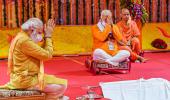It is hard to escape the feeling that solving the problems of 2020 and 2021 will require something special which at the moment is not on view, observes Aakar Patel.

The Modi government came into this second term with a mandate for change.
The NDA government won more seats, more votes in 2019 than it did in 2014 and its performance was endorsed by the electorate to the extent that it can be in a first past the post system such as ours.
This mandate for implementing its ideology was acted on immediately in 2019.
The Supreme Court had invalidated triple talaq in August 2017 and declared its practice unconstitutional.
But the BJP decided it would need to be acted on and in July 2019 the practice, which was already declared unlawful, was now criminalised.
Implementation of a uniform civil code was part of the agenda of the BJP/Jana Sangh going back to the 1950s, and the criminalisation of triple talaq was a victory in this sense.
The following month, Article 370 was gutted in Kashmir and all its non-BJP politicians were jailed indefinitely.
This was the second part of the BJP's agenda, also going back to the 1950s.
Two months later, the Supreme Court delivered the goods on Ayodhya and gave a judgment handing the mosque property to the Hindu party in the dispute.
Within six months, Modi was able to make good ground on all three of the issues that the party had been campaigning on for decades.
The following month, the BJP said it would implement its manifesto promise on citizenship.
Under the section named 'Combating Infiltration', the 2019 BJP manifesto reads: 'There has been a huge change in the cultural and linguistic identity of some areas due to illegal immigration, resulting in an adverse impact on local people's livelihood and employment.'
'We will expeditiously complete the National Register of Citizens process in these areas on priority.'
'In future we will implement the NRC in a phased manner in other parts of the country.'
As the first part of this process, as described by Amit Anilchandra Shah through his famous chronology, the BJP passed the Citizenship (Amendment) Act.
This law would give asylum to non-Muslims from neighbouring states, while the NRC would then come house to house to weed out 'infiltrators' and 'termites'.
The BJP did not anticipate the pushback from India's Muslims and the law, though passed, has still not been implemented 20 months on.
The NRC, which was a 2019 manifesto promise, has also been shelved.
The Delhi pogrom of February was the reaction to this failure.
At this point, however, the spirit of implementing the mandate was still strong.
The farm ordinances came in June 2020, and the government and its allies did not anticipate that the laws would be resisted.
Even the major Punjab party in the NDA, the Akali Dal, remained in the Cabinet when the ordinances were passed and only slipped out of government when it became clear that the farmers were very angry.
The space between the writing of the farm ordinances and the laws being passed in September was occupied by the Covid crisis and its first wave.
The most significant aspects of this period were the national Lockdown, the migrants exodus out of west and south India into the north and east, and the first economic recession for four decades.
The economic crisis had in fact been building progressively since demonetisation but had not been recognised or spoken about in India.
But the outside world had noticed.
In 2014, India's per capita GDP ($1,573) of Rs 117,000 was about 50 per cent ahead of Bangladesh's ($1,118) or Rs 83,000.
At the end of the financial year 2020-2021, Bangladesh went ahead of us at $2,227 or Rs 165,000 per person per year with India at $1,947 or Rs 145,000.
We will remain behind Bangladesh from here on till something changes.
The judiciary put the farm laws in cold storage after asking an expert committee for its views in a 'sealed cover'.
The government itself violated the farm laws by reversing the Essential Commodities Act, but the farmers have been left on the road because the government has moved on and doesn't care about the farm laws any longer.
On other issues also, the success has not been as clear cut as was expected.
Kashmir remains troubled and the leaders who were jailed performed well in the local elections.
The population remains sullen and resistant. China was angered by the change of status of Ladakh and we have seen the consequences of that.
The actual target of the uniform civil code is actually polygamy and so the victory on triple talaq did not mean that much ultimately.
The nation is restless though this restlessness has not found proper political expression.
NDA ally Nitish is asking for a caste census which the government has declined (India's entitlements are still distributed on the basis of a socio economic census that was conducted under Manmohan Singh a decade ago).
Abroad, the government has lost its friends Trump, Abe and Netanyahu and India.
The US leader left without being able to conclude even a trade deal with his friend Modi.
Modi spent much of his rightly earned political capital in 2019.
It is not fully depleted, but it is hard to escape the feeling that solving the problems of 2020 and 2021 will require something special which at the moment is not on view.
Aakar Patel is a columnist and writer and you can read Aakar's earlier columns here.
Feature Presentation: Aslam Hunani/Rediff.com










